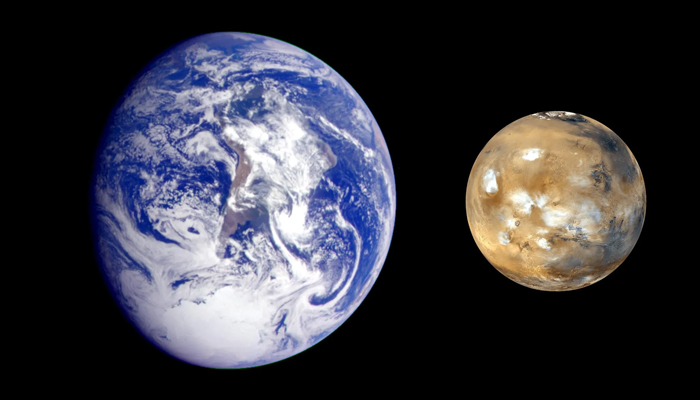Scientists found astonishing link between Mars and Earth's oceans
Study reveals that deep-sea currents have been weakening, strengthening during 2.4m-year climate cycles
March 12, 2024

Scientists have made a surprising revelation about the impact of the red planet on our oceans as experts studied and analysed sediments to acquire a deeper understanding of Earth.
The researchers found in their study published in the journal Nature Communications Tuesday that Mars has been behind causing giant whirlpools in our oceans.
The collected sediments suggested that deep-sea currents have been weakening and strengthening during the 2.4 million-year climate cycles.
While explaining the findings, the study’s co-author and sedimentologist at the University of Sydney, Adriana Dutkiewicz said the discovery of these cycles was unexpected.
The co-author said in a statement: "They are linked to cycles in the interactions of Mars and Earth orbiting the Sun."
According to the study researchers, their findings are the first to reveal these surprising connections.

Both planets make their impact on each other through a phenomenon called "resonance". In this process, two bodies orbiting the same axis interact through a gravitational push or pull — also called harmonization between two plants.
This exchange caused a change in the shape of their orbits influencing their circle and their distance from the sun.
In such interactions with Mars, Earth sees warm temperatures causing more vigorous ocean currents, according to the study.
Dietmar Müller, professor of geophysics at the University of Sydney and a study co-author said: "While these 2.4 million-year cycles affect warming and ocean currents on Earth, they are natural climate cycles and not linked to the rapid heating the world is experiencing today as humans continue to burn planet-heating fossil fuels."
According to the research writers, the currents in the oceans are termed "giant whirlpools" reaching the bottom of the ocean, eroding the seafloor. It also results in accumulations of sediments, like snowdrifts.
CNN reported quoting Müller that because satellite data can visibly map changes in ocean circulation and has only been available for a few decades, sediment cores — which help to build a picture of the past going back millions of years — are very useful for understanding circulation changes in a warmer climate.
Müller said that if today’s human-caused warming continues on its current trajectory "this effect will dwarf all other processes for a long time to come," adding that but "the geological record still provides us with valuable insights about how the oceans operate in a warmer world."
Experts also noted the possibility of mitigation of some of the impacts of a potential collapse of the Atlantic Meridional Overturning Circulation (AMOC), an ocean circulation helping the process of warm water transportation from the tropics to the far North Atlantic.
A collapse of such system would have disastrous climate impacts.
"Our work does not say anything about what may or may not happen to AMOC," Müller said adding that "our point is, rather, that even if AMOC were to shut down, there are still other processes to mix the ocean, even though their effects would be quite different."











